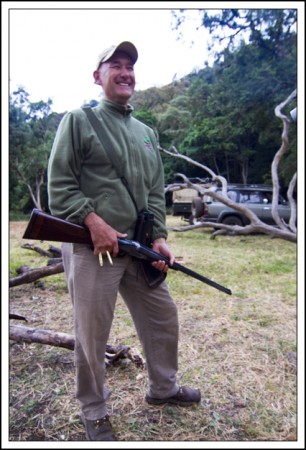I eat better out here in the woods then I do at home. Every morning before we even get up, Julius, our mpishi or cook, bakes fresh camp bread. I don’t know how he does it but it’s finer than most bread you’d find in a bakery. He toasts it over the open fire and serves it with scrambled eggs and bangers and bacon. After we’ve had all that, he brings us some pancakes with syrup and after that a large plate of fruit—watermelon, oranges, mango. Along with copious amounts of tea and coffee and orange juice.
At home I could care less about breakfast but camping out here at Lake Paradise, I’m always starved. You’ll notice from the above photo that there’s a fair amount of whisky and wine mixed in with the juices. We try not to mix these up at breakfast, but sometimes mistakes are made and then, rather than tossing off the inch or two of good whisky that has been errantly poured into a coffee cup, we’ll just add the coffee and drink it off quickly. This seems to fortify us for whatever adventure we’re on that day.
This morning we were going to go stalk buffalos in the woods so while the rest of us downed our eggs and bacon, Calvin assembled his Rigby .500 double, a British gun made in 1898 for one Colonel DeCourcy who was in the British Raj, for tiger hunting, I believe. Colonel DeCourcy then sent the gun to Nairobi when guns that large were banned in India and Calvin’s grandfather, Mike Cottar, ended up with it.
Calvin says his great-grandfather, Bwana Charles, hated all things British, including their guns, and tried to dissuade his son from using it but it became Mike’s favorite safari rifle. After Mike died, from injuries he suffered from a horrific buffalo attack, the family sold the gun. Then it popped up again back in Nairobi sometime in the late ‘50s or early ‘60s and Calvin’s father, Glen, bought it back. He had the old Rigby with him one day in 1965 when he and an Argentine client were hunting buffalo (you’ll notice that danger and buffalos seem to be a leitmotif with the Cottar clan). The client wounded the buff but didn’t kill it. Glen went off into the bush to finish the job. Unfortunately for him, the spring on the Rigby was broken so he had to borrow his client’s gun. According to Brian Herne, who wrote about the attack in his book White Hungers: The Golden Age of African Safaris, Glen fired at the wounded buff in the darkness of a brush tunnel at a range of ten yards.
Convinced the animal was now mortally wounded at last, Cottar and his men tracked it across a small plain as it neared another thicket. As they approached they could make out the vague shadow of a buffalo watching their approach. Glen fired, sure this time he would drop the animal in its tracks. Instead, the buffalo exploded from the bush and came straight for Cottar at a gallop. The massive horns slammed into Glen, smashing him to the ground. The buffalo turned in mid-stride and raced back to work on the fallen man, horns down, hitting Cottar’s legs as he desperately kicked. Glen tried to keep the horn tips from penetrating his chest by holding on to the horns as the beast worked him over. The buffalo kept its forehead close to the ground, its horn boss bulldozing Cottar as it tried to grind him into the dust and finish him off.
As suddenly as the buffalo had carried out its deadly attack, it just as quickly broke it off, heading for the brush at a trot.
In the center of the grassy glade Cottar lay bleeding from horn wounds in his thighs. His legs were ripped open, and the muscles torn away to expose bone on the calf of his leg.
The safari rushed to Glen’s camp, where his client immediately took charge, injecting Glen with an ampule of morphine and penicillin.
Then Cottar was put in the backseat of a Land Cruiser and driven to Nairobi, more than 250 miles away, at night, by his Kipsigi tracker, Pissey. Only this heroic 13-hour drive saved his life. Cottar later blamed the fact that he hadn’t been able to use his old reliable Rigby .500 on his inability to kill the buffalo. Which is why Calvin never goes into the bush on foot looking for buffalos without his father’s gun. I just hope he doesn’t need to use it this morning.
Tags: Lake Paradise
-
i would have laid off the whisky in the coffee knowing that story in advance. maybe that better explains one’s judgement in what we all know is another story to come about the lake?
-
Might the gun be a 500/416? (The rounds are necked down.) And the bullet be 500 grains? Shooting a 50 caliber (half-inch bore) light rifle, doubled or not, is something one does but once a month. The intervals, should one voluntarily do it twice, are spent in recuperation, or in a spica cast.
If you can, get a demonstration.
Comments are now closed.



3 comments